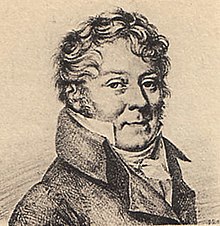Victor-Joseph Étienne de Jouy

Victor-Joseph Étienne, called de Jouy (19 October 1764 – 4 September 1846), was a French
Life
De Jouy was born at
On the outbreak of the Revolution he returned to France and served with distinction in the early campaigns, attaining the rank of adjutant-general. He drew suspicion on himself, however, by refusing to honor the toast of Marat, and had to flee for his life.[2]
At the fall of the Terror he resumed his commission but again fell under suspicion, being accused of treasonable correspondence with the English envoy, James Harris, 1st Earl of Malmesbury who had been sent to France to negotiate terms of peace. He was acquitted of this charge, but, weary of repeated attacks, resigned his position on the pretext of his numerous wounds.[2]
At some point de Jouy married the British born daughter of the novelist Lady Mary Hamilton who had moved to France with George Robinson Hamilton.[4]
De Jouy now turned his attention to literature, and produced in 1807 with immense success the libretto for
In 1821 his tragedy of Sylla gained a triumph due in part to the genius of the actor
Works
Some of the most notable out of the long list of his opera librettos, tragedies and miscellaneous writings are:
- Spontini
- La Vestale(1807), opera, music by Spontini
- Fernand Cortez (1809), opera, in collaboration with J.-A. Esménard, music by Spontini
- Les amazones, ou La fondation de Thèbes (1811), opera, music by Étienne Méhul
- Tippo Saeb,[7] tragedy (1813)
- Les Abencérages, ou L'étendard de Grenade (1813), opera, music by Cherubini
- Belisaire, tragedy (1818)
- Les Hermites en prison (1823), written in collaboration with Antoine Jay, like himself a political prisoner
- Rossini
- Guillaume Tell (1829), opera, with Hippolyte Bis, music by Rossini.
See also
Notes
- ^ Claude Pichois, "Pour une biographie d'Étienne Jouy," Revue des sciences humaines (April–June 1965:227–252, given a synopsis in N. Furman,, La Revue Des Deux Mondes Et Le Romantisme (1831–1848) 1974:12 note 5.
- ^ a b c d e One or more of the preceding sentences incorporates text from a publication now in the public domain: Chisholm, Hugh, ed. (1911). "Jouy, Victor Joseph Étienne de". Encyclopædia Britannica. Vol. 15 (11th ed.). Cambridge University Press. p. 525.
- ISBN 1-84391-040-3.
- ^ . Dictionary of National Biography. London: Smith, Elder & Co. 1885–1900.
- Chaussée d'Antin, or, observations on French manners and customs at the beginning of the 19th century"
- ^ Pichois 1965 noted in Furman 1974.
- Tippoo Sahib (1750–1799) was the sultan of Mysorewho had recently defied the British in Inmdia.
References
- Michel Faul, Les aventures militaires, littéraires et autres d'Etienne de Jouy (Editions Seguier, France) March 2009, ISBN 978-2-84049-556-7)
